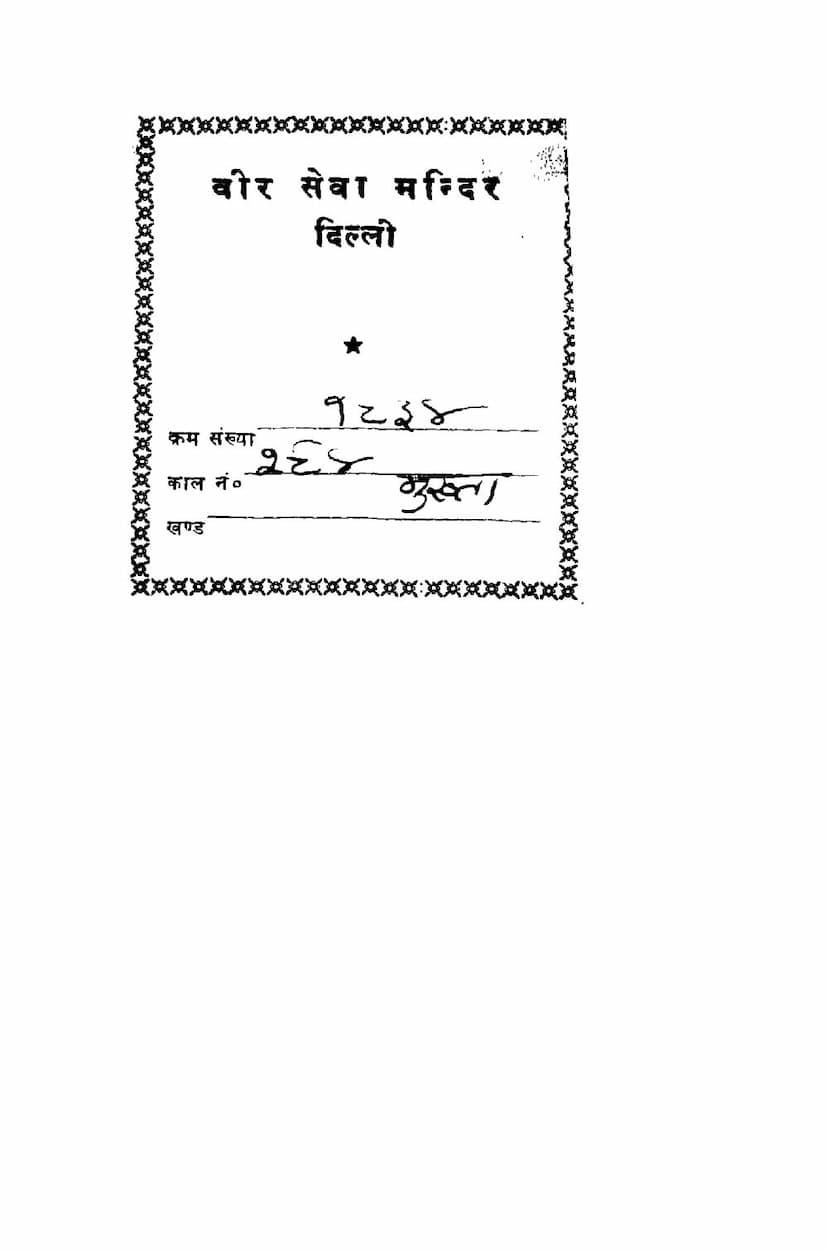Aryamatlila
Added to library: September 1, 2025

Summary
Here is a comprehensive summary in English of the Jain text "Aryamatlila" by Jugalkishor Mukhtar:
The book "Aryamatlila" (Aryamatlila), compiled by Jugalkishor Jain Mukhtar, a resident of Sirsawa and a lawyer, and published by Shri Jain Tattva Prakashini Sabha of Etawah, is a critical examination of the Vedic interpretations and doctrines promoted by Swami Dayanand Saraswati and the Arya Samaj movement. The text, originally published in the Jain Gazette, aims to expose the perceived contradictions and flaws in the Arya Samaj's understanding of the Vedas and their foundational principles.
The author, a Jain scholar, meticulously analyzes various claims made by Swami Dayanand Saraswati regarding creation, the nature of God, the origin of humanity, and the interpretation of Vedic verses. The primary thrust of "Aryamatlila" is to demonstrate that:
-
Contradictions in Creation and Origin of Humanity: The text challenges Swami Dayanand's assertions about God creating hundreds and thousands of human beings in the beginning without parents. Mukhtar argues that this contradicts natural laws and the very principles of creation, questioning how these beings would survive without sustenance or guidance. He contrasts this with the scientific understanding of gradual evolution and procreation. The author also critiques the idea that humans were first created in Tibet and then migrated to India, questioning the historical and logical basis for such claims.
-
Misinterpretation of Vedic Texts: A significant portion of the book is dedicated to demonstrating how Swami Dayanand allegedly misinterpreted Vedic hymns to support his own agenda. Mukhtar analyzes various Vedic verses, suggesting that their literal interpretation, as presented by Swami Dayanand, is often forced and illogical, serving to support pre-determined conclusions rather than reflecting the true meaning. He highlights instances where he believes words are twisted or context is ignored to fit Arya Samaj doctrines, particularly concerning the origin of life, the nature of God, and practices like Sati.
-
Critique of Arya Samaj Doctrines: The book scrutinizes several key Arya Samaj beliefs. For example, it questions the Arya Samaj's rejection of idol worship while pointing out instances where they seem to venerate certain figures or concepts. It also addresses the Arya Samaj's stance on concepts like karma, reincarnation, and the ultimate goal of liberation, comparing them with Jain philosophy and highlighting perceived inconsistencies.
-
Allegations of Bias and Manipulation: Mukhtar accuses Swami Dayanand of selectively interpreting scriptures and presenting biased arguments to promote his reformist agenda and gain followers. He suggests that Dayanand's interpretations were often driven by a desire to discredit other religions, particularly Jainism and other Indian traditions, while elevating the Vedic tradition in a way that suited his narrative. The author points out that Dayanand's own interpretations sometimes contradicted earlier Vedic understandings or even his own earlier statements.
-
Focus on Jain Philosophy: Throughout the critique of Arya Samaj, Mukhtar implicitly or explicitly draws parallels with Jain philosophy. He emphasizes Jain principles of ahimsa (non-violence), a scientific understanding of karma and its transmission, the emphasis on individual effort for liberation, and the detailed philosophical frameworks that underpin Jainism. He presents Jainism as a rational and comprehensive path to liberation.
-
Specific Examples of Contested Verses: The text delves into specific Vedic hymns, providing Mukhtar's interpretation and contrasting it with Dayanand's. These examples often relate to creation, the description of deities, and the purpose of rituals, where Mukhtar argues that Dayanand's translations are allegorical or forced to fit his preconceived notions. For instance, he discusses interpretations of verses related to 'Soma' and other rituals, suggesting they are symbolic or historical rather than literal divine commands in the way Dayanand presented them.
-
Contradictions within Dayanand's Teachings: Mukhtar points out perceived inconsistencies within Dayanand's own teachings, suggesting a lack of a fixed philosophical stance or a tendency to adapt interpretations to suit immediate arguments. The author suggests that Dayanand's followers often accept his pronouncements without critical examination.
In essence, "Aryamatlila" is a scholarly and polemical work from a Jain perspective that aims to dismantle the Vedic interpretations of Swami Dayanand Saraswati. It argues that these interpretations are often flawed, contradictory, and driven by a desire to establish Arya Samaj as the sole path to truth, while neglecting the rational and deeply philosophical underpinnings of Jainism. The book encourages critical thinking and a thorough examination of religious texts and doctrines, inviting readers, particularly those within the Arya Samaj, to reconsider their inherited beliefs in light of comparative religious studies and rational inquiry.